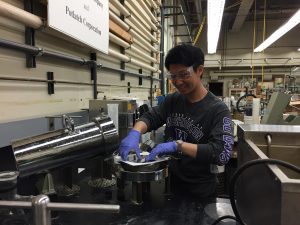Sustainable Bioresource Systems Engineering (SBSE) Major [formerly BSE]
 Degree Overview
Degree Overview
[Note: As of Autumn 2025, the Bioresource Science and Engineering (BSE) major is superseded by the Sustainable Bioresource Systems Engineering (SBSE) major. Present BSE majors will be able to complete their BSE degrees, but the BSE major is no longer admitting. The SBSE Major and the BSE Majors are very similar, but SBSE has a handful of different requirements, and many existing SBSE courses have been substantially updated. Both BSE and SBSE students take the same core courses, only now at the SBSE course prefix. If you have any questions, please email SEFS Advising]
The Sustainable Bioresource Systems Engineering (SBSE) major combines process engineering, materials science, and sustainability fundamentals to provide students with a versatile foundation to engineer sustainable bio-based systems. Students in the major study bio-based processes and products by applying sustainability metrics and process engineering fundamentals. Graduates of the major find employment opportunities with industry, consulting firms, NGOs, and government agencies.
SBSE students apply a strong science foundation and engineering problem solving skills to address many of the grand challenges facing us today. Students acquire expertise in the bio-based processes that provide a means to address grand challenges such as climate change and plastic pollution in our oceans. Production of fuels, chemicals and biodegradable materials from biomass is a route to having a truly circular economy that meets these challenges.
SBSE graduates apply their scientific know-how, process engineering expertise, and knowledge of sustainability fundamentals to manufacturing environmentally friendly products and designing low impact, but economically viable, processes. Students in the major are also challenged to address social and cultural impacts of their engineering solutions so that any proposed bio-based product or process is truly sustainable.
Learn more about the SBSE Major and how the Washington Pulp and Paper Foundation supports career pathways in the video below.
Download the BSE Major Brochure:
Sample Areas of Research Conducted by SBSE Faculty
- Production of nanocellulose, and other nanomaterials, from biomass.
- Conversion of biomass into sustainable aviation fuel.
- Techno-economic and life cycle assessments of processes to produce fuels, chemicals, and materials from biomass.
- Biodegradable fiber composites.
- High performance sensors manufactured from bio-based materials.
- Bioconversion of biomass into biofuels and bio-based chemicals and materials.
- Biomass cultivation for the dual purposes of treating wastewater and providing biorefinery feedstock.
- Biorefinery anerobic digesters to treat waste and produce renewable natural gas.
Scholarships and Other Funding
SBSE students can apply annually for substantial scholarship funding through the SEFS ESRM and SBSE Undergraduate Scholarship program. These scholarships are supported by our generous SEFS donors, and also by donors from the Washington Pulp and Paper Foundation (WPPF).
SBSE Careers and Career Support
SBSE and SBSE graduates begin careers in manufacturing, engineering, technical service, sustainability consulting, and management training. Positions include process engineer, process designers in engineering consulting firms, technical sales engineer, product development engineer, environmental engineer, research engineer, and sustainability specialists and experts in government, corporations, and NGO firms, as well as many other specialties that require a fundamental background in process engineering, bio-based processes, and sustainability. Select recent employers of SBSE alumni are featured in the BSE Brochure.
SBSE students are supported by the Washington Pulp and Paper Foundation (WPPF), a 501c3 organization based in our School, in acquiring engineering internships and permanent employment. Virtually all SBSE and BSE students have one or more internships before they graduate. SBSE and BSE students also receive help from SEFS Advising, the UW Career Center, and the Career Center @ Engineering in seeking employment and internships.
Double Degree or Double Major Opportunities and Opportunities to Minor
Some students may find that earning a double degree or double major is the best way to meet their educational objectives. The two most common additional degrees SBSE students earn are with Environmental Science and Resource Management (ESRM) or with Chemical Engineering, though completing a double degree with SBSE and CHEM E is very time-consuming. Potential students interested in this possibility are encouraged to discuss their goals with the pertinent academic advisors to review your potential plan of study and to determine whether a double degree or double major is the best option to meet your educational goals, or would it be best completing only one Bachelor’s degree, and earn a Master’s degree in the second major area. Particularly with Chemical Engineering, or with Materials Science and Engineering, where it is possible to earn a Master’s degree with only one additional year of study, it is much less time consuming to earn a Bachelor’s degree in SBSE and a Master’s in one of those fields, and an SBSE degree will prepare you for graduate school in either of these areas.
The UW offers numerous degree minors, including the ESRM minor in our School. Minors are declared with your major advisor.
How Can I Learn More and Join the Mailing List?
If SBSE sounds interesting to you, please contact or make an appointment with an Academic Advisor from our School, who can provide you program details and connect you with BSE faculty and/or students to find out more about the program. You may be able to do research in a SBSE lab even before picking a major or take a SBSE course if you have the right prerequisites.
The department maintains a mailing list for students interested in the SBSE major and also students who are declared pre-majors for SBSE (PREBSE-coded UW students). Current UW and non-UW students can join the PREBSE mailing list by submitting the Mailman sign-up form.
How Do I Join the SBSE Major?
Our Admissions Section has all the information you need.
Statement of Non-Discrimination
The University of Washington prohibits discrimination, harassment and sexual misconduct in any education program or activity that it operates. Individuals may report concerns, make complaints, or direct inquiries to the Civil Rights Compliance Office. The statement of nondiscrimination is located at: uw.edu/civilrights/policies-and-guidance/statement-of-nondiscrimination/.